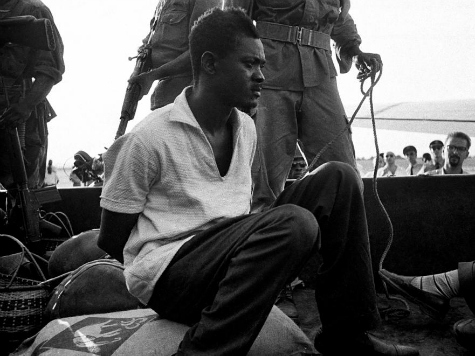The current issue of Foreign Affairs (July/August 2014) contains an article about the 1960-1961 crisis in the Congo. Its key point is as follows:
The root of the CIA’s intervention in Congo was an overhyped analysis of the communist threat. Congo scholars have long been skeptical of the notion that had [Congolese Leader Patrice] Lumumba stayed in power, his government would have fallen under the sway of the Soviet Union or China… The skeptics were right: Lumumba was never a communist, and he would not have yielded to foreign control. He and his supporters had cut their political teeth in the struggle against colonialism, and they found any form of external domination anathema. They were far more interested in nonalignment, and the foreigners they identified with were other African independence leaders, not Khrushchev or Mao.
There is strong evidence to the contrary.
The November 25, 1960 edition of The New York Times contains the details of an intelligence report obtained in London:
Mr. Lumumba and his supporters discussed independence in February in Brussels. On Feb. 7 Mr. Lumumba attended a meeting of the Liege branch of the Belgian Communist party, according to the report.
During this visit to Belgium, it was reported, Mr. Lumumba negotiated with Albert Goyens, militant Belgian Communist, for material to aid his election campaign.
Antoine Gizenga, president of the African Solidarity party in Leopoldville area and Vice Premier in the Lumumba Government, visited Prague and Moscow in 1959 and 1960, it was said.
According to the report, three other politicians from the Congo attended the Thirteenth Congress of the Belgian Communist party in Liege April 16. They were Alphonse Nguvulu, president of the People’s party in the Leopoldville area and Minister of State in Mr. Lumumba’s Government, and two of his supporters.
Ernest Brunel, secretary of the Belgian Communist party, addressed the guest as “Congolese comrades” and pledged the party’s support for their efforts at the meeting.
During their stay in Belgium, the Congolese were under the guidance of Jean Terfve, lawyer and member of the politburo of the Belgian Communist party. M. Terfve later became one of Mr. Lumumba’s chief advisers.
….
In January, the Belgians were said to have investigated a report that M. Pinzi, Communist Mayor of an African suburb of Leopoldville, had returned to the Congo from Brussels with [a] detailed plan for revolt.
The report estimated that Mr. Lumumba had received the equivalent of $299,600 for propaganda purposes from the Belgian Communist party.
Lumumba chose the occasion of the Independence Ceremonies to give a speech ripping into Europeans, and within days (almost on queue) Lumumba loyalists went on a rampage killing and terrorizing not only their Congolese political opponents, but all who even looked European. That same month (July 1960), stories began to appear such as this one from the AP: “A freighter from communist Poland carrying 300 tons of arms was reported by Belgian officials Sunday to be heading for the mouth of the Congo river, gateway to the troubled Congo Republic.” Soviet military equipment and Eastern Bloc “technicians” (who were just as white as West Europeans, but for some reason were not attacked) were flown into the Congo on Soviet Aircraft and put at the disposal of Lumumba.
When Lumumba was arrested in September, a number of revealing documents were found in his briefcase, copies of which were obtained by the Chicago Daily Tribune. On November 2, 1960 the Tribune described one document with orders Lumumba intended for a provincial underling, in detail:
It is marked “strictly confidential” and its stated object is: “Measures to be applied in the first phase of the dictatorship.”
…
“Do not forget,” Lumumba wrote, “to continually encourage our comrades scattered thruout [sic] the province, affirming to them in accord with the agreement, the Congo will become what they have demanded of us. [This apparently referred to an agreement with the Russians to make a satellite of the Congo.]
“Finally, in your program of arrests of members of the opposition and others, it is suitable to begin with the most influential… all the big chiefs and even certain of your collaborators, members of the provincial government, who might criticize you.
“In acting this way everybody at Stanleyville will be afraid of your authority as they are afraid of mine here at Leopoldville.
“In this way we shall end up by leading all the inhabitants of the republic by the nose, beginning… with the Eastern province, which is already safely in the control of our comrades of the East [presumably the Russians], who under the label technicians have already begun cleverly and effectively to disseminate the first attractive bits of our doctrine.
“Get to work immediately and have courage.
“Long Live the Soviet Union. Long Live Khrushchev.”
At this point the old Cold War “Duck test” should come in handy: He acts like the Communists, is armed by the Communists, and works hand-in-glove with the Communists. So what is he?
I once asked Ion Mihai Pacepa, the highest-ranking Soviet Bloc official ever to defect to the United States and the author of a book exposing Soviet disinformation, about this. He told me: “To the best of my knowledge, Lumumba was a Communist used by the KGB as an agent of influence. No wonder that in 1966 the Soviet Union’s third-largest university was given his name.”
For a short and simple overview of the events of the 1960-1961 crisis in the Congo, chapter 15 of Paul Johnson’s masterful Modern Times is highly recommended.

COMMENTS
Please let us know if you're having issues with commenting.